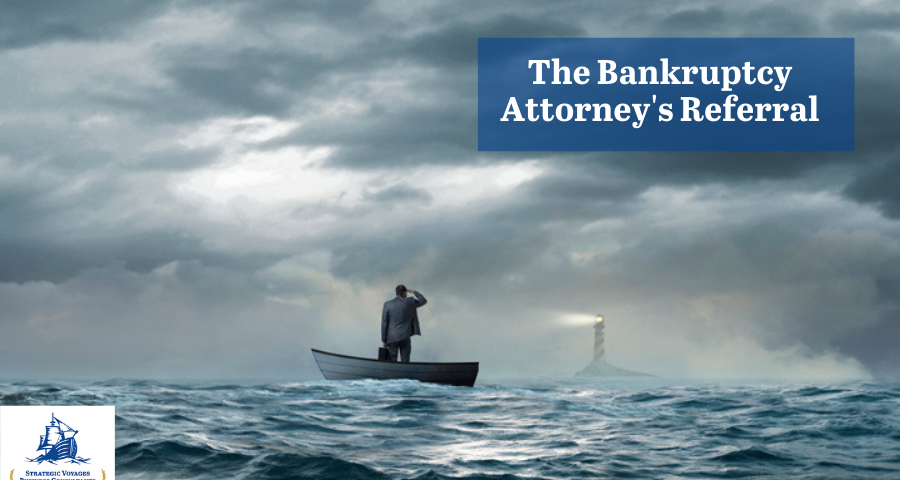Not every business owner I meet is holding a sign saying, “Help! I’m drowning in debt.” But this meeting was as clear a sign as any that they needed serious help.
“I’m sorry. Hang on a second. Are you telling me that you agreed to take $100,000 only to have to repay $140,000 in 9 months!? That’s insane. That interest rate is like north of 50%.” The smartly dressed businesswoman held her head in one of her hands while holding her chic reading glasses in the other. Her hand holding the glasses slightly trembled with the weight of the words that just left her mouth.
As I sat in the conference room last week I had the opportunity to witness a complete meltdown between two business partners. As typically set up, one partner is responsible for the “back of house,” that is the billing and collection of revenue, the accounting of monies owed to vendors, processing payroll, and generally making sure the business has enough cash to operate. The other partner is responsible for the “front of house.” This is typically the sales side, the rain makers and deal makers, the face of the business to potential employees, clients, vendors, and maybe even investors. It generally takes both parties to effectively build and run a business. However, this meeting was headed off the rails real quick; one partner hadn’t fully disclosed the details of a new debt instrument they decided to take out on the business’s behalf.

“I didn’t know what else to do. I figured we always found a way to repay our debts so this wouldn’t be any different. We needed to make payroll a few weeks ago and you were too busy to talk to me about this.” The palms out, shoulders shrugged, mouth agape look signaled a “I don’t know what to say” look that has undoubtedly been mastered over years of practice between the two partners. He relaxed his shoulders and sat back down in his chair. His demeanor had shifted from what was once a confident and borderline cocky businessman to thoroughly embarrassed as if being caught red handed in a situation he wished he wasn’t in. “Matt. That’s why I called Matt. I didn’t know what else to do so I called Matt. What do we do now? Cause I need some guidance. Some help! I’m drowning in debt!”
I don’t always quote my own book for fear of being accurately accused of being the obnoxious author who has to remind people he’s an author. However, this past week, I found myself grabbing a copy of my book, Taboo Business Questions: What’s Haunting Every Entrepreneur’s Growth, and flipping to the Finance Chapter so as not to mince words. I wrote this book in my twenties from what originally started as a journal of the various business issues that I saw business owners mismanage. The number one issue is finances. Not everyone is brave enough to ask for help, but admitting you have a problem is generally the first step towards recovery.
On page 28 in Taboo Business Questions, I began reading. “Number Five on the list of The Eight Signs You’re Not Ready For Financing is this: No Debt Repayment Strategy.” I looked up quickly to make sure I hadn’t lost the two partners. Sometimes when discussing highly emotional topics, debt and finances being close to the top of the list right next to infidelity and theft, the message is less about what needs to happen and more about the commitment to making a change.
I continued reading, “A debt repayment strategy is a formal term for considering how you will pay back the financing you took out. It doesn’t need to be a formal document but writing it out forces you to consider: what you will use the funds for, if it’s revenue generating, is financing really necessary, how fast you will realistically be able to pay it back. If you haven’t at least considered a debt repayment strategy, securing financing should be delayed.”
I took a breath and stepped up to the whiteboard to begin writing out the next steps. As I often do, I aim to teach. Teaching isn’t done by just telling. It’s done through illustration, repetition, and application. If I read them this section from my book and left it at that the likelihood of them applying the correct solution would be slim.

I wrote the following questions:
- What were the funds used for?
- Does it generate revenue?
- What other options were there / are there?
- What’s going to change to be able to repay the debt?
Without answering, or at least pondering, these four questions, business owners shouldn’t take out financing. Financing with interest rates like repaying $140,000 in 9 months on an original loan amount of $100,000 need to be extremely calculated because if you’re not generating some serious profits, this type of debt will ruin your business. It should only be considered as a stop gap or temporary solution while some other big changes are made to the business.
These business owners, after gathering themselves, began to ask the right questions. They wanted to know:
- “What can we do to fix our cash flow problems so we never have to borrow money like this again?”
- “Where else could we borrow money for cheaper than these rates?”
- “How can we improve our communication process around the finances to make this a more collaborative effort?”
The meeting held some important conversation points. The partners actually discussed and responded to important decisions together. They asked for another meeting with my help to guide them towards making better financial decisions.
Interested in seeing if an outsourced CFO is the right fit for your company? Contact my office today.
847-802-9405





